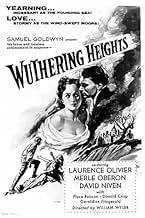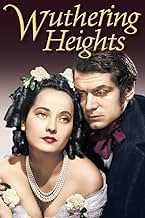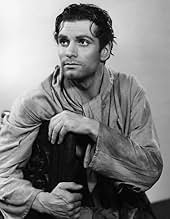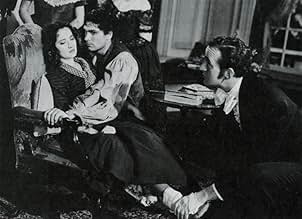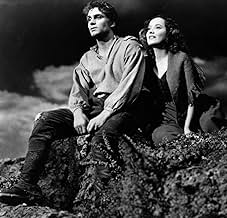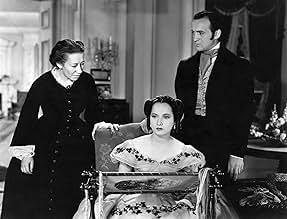VALUTAZIONE IMDb
7,5/10
20.888
LA TUA VALUTAZIONE
Una domestica nella casa di Wuthering Heights racconta a un viaggiatore la sfortunata storia degli amanti Cathy e Heathcliff.Una domestica nella casa di Wuthering Heights racconta a un viaggiatore la sfortunata storia degli amanti Cathy e Heathcliff.Una domestica nella casa di Wuthering Heights racconta a un viaggiatore la sfortunata storia degli amanti Cathy e Heathcliff.
- Regia
- Sceneggiatura
- Star
- Vincitore di 1 Oscar
- 9 vittorie e 7 candidature totali
Sarita Wooton
- Cathy (as a child)
- (as Sarita Wooten)
Frank Benson
- Heathcliff Servant
- (non citato nei titoli originali)
Romaine Callender
- Robert
- (non citato nei titoli originali)
Richard Clucas
- Little Boy
- (non citato nei titoli originali)
Vernon Downing
- Giles
- (non citato nei titoli originali)
Recensioni in evidenza
I have not read the Emily Bronte novel on which this film is based so obviously I cannot comment on the effectiveness of it as an adaptation (I understand that almost the entire second half of the book was excised). However, I thoroughly enjoyed the film. Oberon and especially Olivier, one of my favorites, are very convincing and moving as the doomed lovers Cathy and Heathcliff (according to my friend, Heathcliff is written as being much more likeable in the film than in the book). The supporting cast was also very good. Wuthering Heights just deals very poignantly with the effect that birth and status have on people's lives. Yet another winner from Wyler. My score 9/10.
Talk about a brooding outdoors, those moody moors may represent a sense of liberation for the lovers, but they're not exactly inviting. Besides, it rains all the time, so best to be in the house even if mansions represent the confining space of class and class privilege. That's the trouble. Cathy is 'to the manor born', as they say. Thus she's really torn between the wild outdoors and the comforts of ballrooms and servants.
Then there's the enigmatic Heathcliffe, a dark wild-souled type guy, perfectly at home in those bleak rolling hills. He was a street ragamuffin before Cathy's elderly father adopted him into the manor as a stable boy. But he and a young Cathy manage to bond despite the class difference, a bond that eventually blossoms into true love. But that true love only breaks to the surface in the wild outdoors where a common humanity replaces artificial social distinctions. If only Cathy could find the will to break free of the leisure class.
What a great visual experience, the b&w expertly coordinated with the settings. When the two lovers approach the rocky crag, there's almost a feeling of an outdoor altar calling to them amidst the brooding hills. It's such a perfect visual contrast to the high-key ballrooms and parlors of the Lintons. The Lintons, however, are not to be despised despite their airs and privileges. In fact, they are very real victims of Cathy's suppressed feelings and Heathcliffe's cold calculations. As it turns out, there is no spectral salvation for them. As a result, the love being portrayed here is a kind of mad love, one that brings tragedy to all concerned. Thus, there's a reason those moors brood in dark fashion, while the movie itself remains the best of the many makes and remakes.
Then there's the enigmatic Heathcliffe, a dark wild-souled type guy, perfectly at home in those bleak rolling hills. He was a street ragamuffin before Cathy's elderly father adopted him into the manor as a stable boy. But he and a young Cathy manage to bond despite the class difference, a bond that eventually blossoms into true love. But that true love only breaks to the surface in the wild outdoors where a common humanity replaces artificial social distinctions. If only Cathy could find the will to break free of the leisure class.
What a great visual experience, the b&w expertly coordinated with the settings. When the two lovers approach the rocky crag, there's almost a feeling of an outdoor altar calling to them amidst the brooding hills. It's such a perfect visual contrast to the high-key ballrooms and parlors of the Lintons. The Lintons, however, are not to be despised despite their airs and privileges. In fact, they are very real victims of Cathy's suppressed feelings and Heathcliffe's cold calculations. As it turns out, there is no spectral salvation for them. As a result, the love being portrayed here is a kind of mad love, one that brings tragedy to all concerned. Thus, there's a reason those moors brood in dark fashion, while the movie itself remains the best of the many makes and remakes.
Great literature enriches the soul. The Brontes created great literature because they invented so much of what it means. They invented ways of observing the soul that hadn't already been mined by Shakespeare. If you want a great film that celebrates, explores, exploits Bronte, you can't escape the reality that you'd have to stretch film the same way Charlotte stretched perspective.
Didn't happen here. Olivier seemed good enough at what he knew (stage acting) but that isn't bendable to great experiences in film. Never was.
But you might want to watch this for another reason. The dialog and acting are ordinarily conceived. But the cinematography is extraordinary, from the very special Greg Toland. Greg DID stretch cinema in the way we mentioned. His greys have depth. When he photographs the heath, we feel the atmosphere as if the mist had emotion.
The interiors of the house are magnificent in design. And Toland's lighting and framing are so haunting.
This film is why Orson Welles wanted him on "Citizen Kane." You need to watch it to see where much of the disembodied ghost-observer comes from. With Toland, Cathy defines what we see and how.
But the actual story? Go read it instead.
Ted's Evaluation -- 2 of 3: Has some interesting elements.
Didn't happen here. Olivier seemed good enough at what he knew (stage acting) but that isn't bendable to great experiences in film. Never was.
But you might want to watch this for another reason. The dialog and acting are ordinarily conceived. But the cinematography is extraordinary, from the very special Greg Toland. Greg DID stretch cinema in the way we mentioned. His greys have depth. When he photographs the heath, we feel the atmosphere as if the mist had emotion.
The interiors of the house are magnificent in design. And Toland's lighting and framing are so haunting.
This film is why Orson Welles wanted him on "Citizen Kane." You need to watch it to see where much of the disembodied ghost-observer comes from. With Toland, Cathy defines what we see and how.
But the actual story? Go read it instead.
Ted's Evaluation -- 2 of 3: Has some interesting elements.
10jotix100
"Wuthering Heights", based on the novel by Emily Bronte, gets a first rate treatment from its director, the genial William Wyler. The adaptation was done by Charles McArthur and Ben Hecht, two of the best writers working in the Hollywood of that era. The great cinematography by Gregg Toland makes it visually stunning. Alfred Newman's music score plays in the background, making this film a classic that will be cherished by movie lovers.
Some comments to this forum express their displeasure in the adaptation one sees on the screen. Most people forget what a task it must have been to get the essence of the Bronte novel in a cinematic form, something the adapters did with elegance and charm.
The cast that was assembled for "Wuthering Heights" is a dream come true. Presenting the young Merle Oberon in all her beauty makes one almost fall instantly in love with her. Ms. Oberon had a fantastic presence, which translated in probably her best work in films.
The dashingly handsome Laurence Olivier as Heathcliff, creates the right chemistry against Ms. Oberon's Cathy. Mr. Olivier was at the pinnacle of his career. He responds well to Mr. Wyler's direction. His Heathcliff shows a mean streak, but over all, Olivier gives an impressive performance.
David Niven is excellent as Edgar Linton, the man who wins Cathy's heart with his kindness. Flora Robson does also an outstanding job as Ellen, the housekeeper, who serves as the narrator. The young and beautiful Geraldine Fitzgerald makes a brilliant Isabella.
The rest of the players are equally wonderful, Donald Crisp, Hugh Willimas, Leo G. Carroll, Cecil Kellaway, made contributions to the movie.
Ultimately, this film is a love story doomed from the beginning. This tale of the passion between the lovers in the moors is a perfect way to lose oneself in the magic of the movies.
Some comments to this forum express their displeasure in the adaptation one sees on the screen. Most people forget what a task it must have been to get the essence of the Bronte novel in a cinematic form, something the adapters did with elegance and charm.
The cast that was assembled for "Wuthering Heights" is a dream come true. Presenting the young Merle Oberon in all her beauty makes one almost fall instantly in love with her. Ms. Oberon had a fantastic presence, which translated in probably her best work in films.
The dashingly handsome Laurence Olivier as Heathcliff, creates the right chemistry against Ms. Oberon's Cathy. Mr. Olivier was at the pinnacle of his career. He responds well to Mr. Wyler's direction. His Heathcliff shows a mean streak, but over all, Olivier gives an impressive performance.
David Niven is excellent as Edgar Linton, the man who wins Cathy's heart with his kindness. Flora Robson does also an outstanding job as Ellen, the housekeeper, who serves as the narrator. The young and beautiful Geraldine Fitzgerald makes a brilliant Isabella.
The rest of the players are equally wonderful, Donald Crisp, Hugh Willimas, Leo G. Carroll, Cecil Kellaway, made contributions to the movie.
Ultimately, this film is a love story doomed from the beginning. This tale of the passion between the lovers in the moors is a perfect way to lose oneself in the magic of the movies.
This classic version of the Bronte novel is probably familiar to most movie fans, and with good reason. Although the recent Ralph Fiennes version is also excellent, nothing can quite surpass the 1939 film's bleak black-and-white cinematography or the impassioned performance of Laurence Olivier. Some of us still mourn that his then-wife, Vivien Leigh, wasn't granted her wish to be cast as Catherine, but Merle Oberon is nonetheless excellent: her Catherine isn't quite likable, but then, she isn't supposed to be. Instead of sugar-coating the story as Hollywood is so wont to do, the filmmakers give us Cathy and Heathcliff as they should be: ruthless, selfish, destructive, and fascinating. The only major drawback is the saccharine musical score, which tries to make this wild, haunting story into a candy-box romance. Fortunately, all the other elements resist this tendency. Even though the film only covers half the novel, you'll find it satisfying and unforgettable.
Lo sapevi?
- QuizLaurence Olivier found himself becoming increasingly annoyed with director William Wyler's exhausting style of filmmaking. After yet another take, he is said to have exclaimed, "For God's sake, I did it sitting down. I did it with a smile. I did it with a smirk. I did it scratching my ear. I did it with my back to the camera. How do you want me to do it?" Wyler's retort was, "I want it better." However, Olivier later said these multiple takes helped him learn to succeed as a movie actor.
- BlooperThough the social situations, and even the soundtrack, are consistent with the novel's timeframe of 1770-1801, the Colonial/Napoleonic era, the costumes are an odd mix of mid-Victorian and American Civil War.
- Citazioni
Heathcliff: Catherine Earnshaw, may you not rest so long as I live on! I killed you. Haunt me, then! Haunt your murderer! I know that ghosts have wandered on the Earth. Be with me always. Take any form, drive me mad, only do not leave me in this dark alone where I cannot find you. I cannot live without my life! I cannot die without my soul.
- Curiosità sui creditiOpening credits prologue: On the barren Yorkshire moors in England, a hundred years ago, stood a house as bleak and desolate as the wastes around it. Only a stranger lost in a storm would have dared to knock at the door of Wuthering Heights.
- Versioni alternativeThere is an Italian edition of this film on DVD, distributed by DNA Srl: "CIME TEMPESTOSE (1939) + ORGOGLIO E PREGIUDIZIO (1940)" (2 Films on a single DVD), re-edited with the contribution of film historian Riccardo Cusin. This version is also available for streaming on some platforms.
- ConnessioniFeatured in AFI Life Achievement Award: A Tribute to William Wyler (1976)
- Colonne sonorePiano Sonata in A major, K.331: Rondo alla Turca
(1778) (uncredited)
Music by Wolfgang Amadeus Mozart
Played by Alice Ehlers on harpsichord
I più visti
Accedi per valutare e creare un elenco di titoli salvati per ottenere consigli personalizzati
Dettagli
- Data di uscita
- Paese di origine
- Sito ufficiale
- Lingua
- Celebre anche come
- Cime tempestose
- Luoghi delle riprese
- Azienda produttrice
- Vedi altri crediti dell’azienda su IMDbPro
Botteghino
- Lordo Stati Uniti e Canada
- 624.643 USD
- Fine settimana di apertura Stati Uniti e Canada
- 15.493 USD
- 9 apr 1989
- Lordo in tutto il mondo
- 624.643 USD
- Tempo di esecuzione
- 1h 44min(104 min)
- Colore
- Proporzioni
- 1.37 : 1
Contribuisci a questa pagina
Suggerisci una modifica o aggiungi i contenuti mancanti


